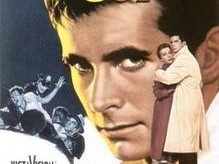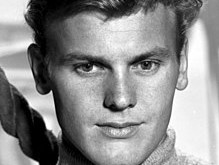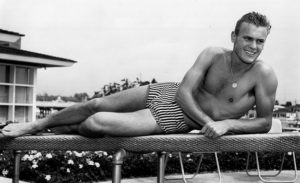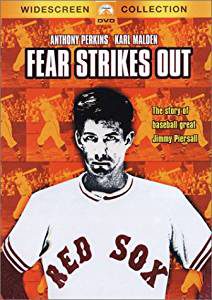Fear Strikes Out *** (1957, Anthony Perkins, Karl Malden, Norma Moore) – Classic Movie Review 7,140
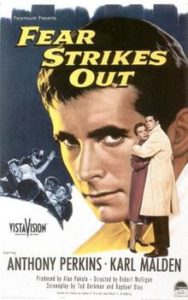
The 1957 drama film Fear Strikes Out stars young Anthony Perkins as Jimmy Piersall, a shy, fearful youth plunged into mental turmoil over his father (Karl Malden)’s overpowering need to make him a baseball player.
Director Robert Mulligan’s 1957 American Paramount Pictures drama film Fear Strikes Out stars the young Anthony Perkins (aged only 24), who makes his mark as Jimmy Piersall, a shy, fearful youth plunged into mental turmoil over his father (Karl Malden)’s overpowering need to make him a baseball player.
Fear Strikes Out is a modest sporting biographical drama, but it tells an interesting father and son relationship story and it is lit up by powerhouse performances from a typically twitchy Perkins and a bruising Malden. It represents highly promising débuts for both director Mulligan and producer Alan J Pakula, and both men went on to fulfill their promise.
Ted Berkman and his brother-in-law Raphael Blau co-wrote the screen play, based on Piersall’s 1955 book memoir Fear Strikes Out: The Jim Piersall Story, co-written with Al Hirshberg. The screenplay is based on the autobiography of real-life professional baseball player star Jimmy Piersall, as the Boston Red Sox star from Waterbury, Connecticut, who suffers a nervous collapse, descends into mental illness and goes to a mental institution. Extended work in therapy eventually makes Jimmy clear he has only excelled in baseball to please his father.
For better or for worse, the role typecast Perkins for ever though, no doubt leading him to Norman Bates in Psycho.
Peter J Votrian plays the younger version of Piersall.
Documentary footage of the stadium scenes is used during the game sequences.
Also in the cast are Norma Moore as Mary Piersall, Adam Williams as Dr Brown, Perry Wilson as Mrs Piersall, Richard Bull as Reporter Slade, Bart Burns as Joe Cronin, Edd Byrnes as Boy in Car Assisting Jimmy Up Stairway, Art Gilmore as Broadcaster (voice), Brian G Hutton as Bernie Serwill, Morgan Jones as Sandy Allen, Bing Russell as Ballplayer Holding Trophy, Gary Vinson as High School Ballplayer, Rand Harper, Gail Land, Dennis McMullen, George Pembroke, Howard Price, John Benson, Eric Alden, Mary Benoit, Don Brodie, Richard Bull, Wade Cagle, Gene Craft, Heather Hopper, June Jocelyn, Marilyn Malloy, Don McGuire, James McNally, Ralph Montgomery, Court Shepard, and Robert Victor Stern.
Fear Strikes Out is directed by Robert Mulligan, runs 100 minutes, is made and released by Paramount Pictures, is written by Ted Berkman and Raphael Blau, based on Jimmy Piersall’s 1955 book memoir Fear Strikes Out: The Jim Piersall Story co-written with Al Hirshberg, is shot in black and white and VistaVision by Haskell B Boggs, is produced by Alan J Pakula, is scored by Elmer Bernstein and is designed by Hal Pereira and Hilyard M Brown.
It was released on 20 March 1957.
It follows a 1955 TV version of Fear Strikes Out starring Tab Hunter as Jimmy Piersall.
In real life, Tab Hunter revealed that he had a romantic relationship with Tony Perkins, which ended after Perkins took the role of Piersall.
Hunter recalled: ‘I was pitching for a movie called Fear Strikes Out, about a famous baseball player, but Tony got Paramount to buy it and went for the role. It made a difference to our relationship. I felt betrayed. I was really disappointed by that. It was sort of the straw that broke the camel’s back. We sort of separated, I guess we just outgrew each other and then we lost touch for a while.’
Hunter described Perkins as ‘a special part of my journey. He wanted to be a movie star more than anything. I wanted that too, but not with the same kind of drive he had. We were such opposites – but then maybe that was the attraction.’
Hunter recalled how the pair met: ‘It was a hot day so I swung by the Chateau Marmont for a swim. And that’s when I first saw Tony. He was there with a songwriter friend, and they were all around the pool. He had just been filming Friendly Persuasion with Gary Cooper and Dorothy McGuire. I went for a swim and when I came out my friend Venetia Stevenson said, “Oh I want you to meet Tony – do you know him?” We hadn’t met, but I already knew that he was a very fine actor. He was at Paramount and I was with Warner Brothers. We just chatted and got on and soon we were starting to see each other.’
‘Warner Brothers never said a word about my sexuality, and that’s just the way I wanted it. However, Paramount did have something to say about my relationship with Tony, and they told him they didn’t want him to see me anymore. Every studio was run by an executive who had their own policies and their own ways of doing things. And Paramount ran a really tight ship.’
© Derek Winnert 2018 Classic Movie Review 7.140
Check out more reviews on http://derekwinnert.com

